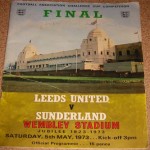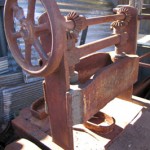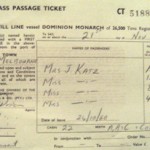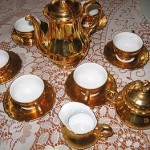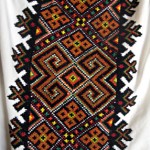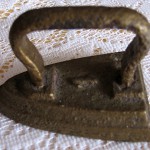English
Winchester, England
Glasgow, Scotland on 31 March 1948
Sydney on 6 May 1948
Fairbridge Farm School village & farm, Molong, NSW (child migrant scheme near Orange) for six years
Farm property near Orange
Fairbridge Farm agricultural/domestic trainee
Farm work near Orange and Warragamba; purchaser for Ex-Services Club, Orange.
I was born on Coronation Day 1937 in Southampton, England. My grandmother wrote to the Duke of Windsor because, being a Coronation baby, they wanted to christen me ‘Edward Windsor’. We got a letter back saying the wish had been granted and so I became ‘Edward Windsor’. But my father registered me and, unknown to Mother, he tagged ‘George’ on the front! I never use ‘George’, but that is my full [name], George Edward Windsor Baker.
When my father died it left my mother destitute with four children. We were evacuated during the [Second World] war to Bournemouth. It wasn’t a terribly happy experience [and] Mother took us back home to Winchester. It was a disaster there. I was constantly bullied. Eventually she had a nervous breakdown, so the doctor recommended my sister and myself go into this Fairbridge home at Benington in Hertfordshire. We were the two youngest. I think I was nine. The eldest sister was just old enough to go to work and the next eldest, my brother, went into a military cadetship.
Benington was in a beautiful, rural setting so it was really great. It was a holding area for children going overseas – Canada or Australia – so a lot of the children were only there for about two or three months. My mother didn’t visit very often. It was a fair way and I guess transport was a problem.
I think [my mother] approved reluctantly with going [to Australia], eventually she must have relented. There was coloured blood in the family so the ‘White Australia’ policy wouldn’t allow my sister to come. My father was quite dark – we’ve only just discovered my grandmother had an affair with a dark coloured man – and it showed up on my sister where I followed after my mother being fair skinned. They were reluctant to let me go on my own but I was quite upset [at] missing out, so eventually they gave me the okay. My sister went into a national children’s home in the UK.
I was 10 when I left, it was all excitement. Most children like an adventure don’t they? I knew at least 30 children at the other end that I had made friends with, so it wasn’t a big deal waving goodbye.
We went by bus to the station [and] boarded a train up to Glasgow [and] sailed. Empire Brent was a single funnel boat but quite enormous to us at the time. It was packed with migrants from different nationalities that were coming to Australia.
[Departing] was quite solemn. Most of the children were fairly quiet, so there must have been a bit of anxiety. In the morning, all we saw was water and then we had a pretty good time. You were meant to have schooling but they couldn’t find anybody [to teach us], so there wasn’t any! It was just having fun, running around and being spoiled. If any of the boys were bullied, they would take them down into the galley and feed you with nice things which was quite a treat in those days; we didn’t get many luxuries. We were spoiled and treated to outings and good food in Perth, Adelaide and Sydney.
We got the train up from Sydney and I am not sure whether it was to Orange or Molong. Coming up the drive [to Fairbridge Farm in] a truck, all these children I knew came running down and greeted you, so I settled in very easily.
[Fairbridge] had a policy of putting most [new] children into the one cottage, as you had known each other. We had two girls with us and they went into a girls’ cottage. But the rest of us, we all went into Canary Cottage, so it wasn’t terribly hard settling in.
Didn’t particularly like the heat. [That] came as a bit of a shock, I liked the cooler weather better. I used to suffer from heat rash in England!
In the winter you only had one fireplace in the main common room, but apart from that, you didn’t stand around in the mornings. You got dressed pretty quickly otherwise you froze to death.
You had shoes but were encouraged to go barefoot because it was healthy, firstly, saved shoes, secondly. After the war there was a shortage and the farm had a fairly tight budget. When you had to go somewhere you would have your shoes on, but mostly village life you got around barefoot. Everybody had to mend their own shoes – girls and boys – and they were leather.
The children just had stainless steel plates but staff had china. The cups, saucers and so forth had the Fairbridge emblem stamped on them. I came by this [china plate] by a good friend of mine who has now passed on. When the farm closed down in ’74, a lot of those things were auctioned off and I think he acquired it there. I quite liked the emblem and some years ago fashioned one out of copper and brass for the roof of my house.
I didn’t mind the school. Initially [it was] on the village when numbers were small [and] went up to intermediate and leaving level. As numbers increased it became a primary school and the bigger ones went to Molong, the brighter ones to Orange.
Oh the training, yes, you had various jobs to do when you became a [farm] trainee and you had a monthly roster. I wasn’t too bad. I am not a city person. I quite like the country, much healthier for you, [so] I liked the rural life.
You didn’t do [traineeship] until you were about 15. That was saving costs because the children did most of the work, a lot supervised by an adult. You had a chef in the kitchen but the boys were responsible for getting the fires going, making sure the stoves were hot, bake all the bread and so forth. I didn’t mind kitchen, you got a few extra treats there. Then you had a farm manager who oversaw the boys doing all the milking. I think you had about 40 odd cows to milk in my day, by hand. Then you slaughtered the sheep.
We used to produce a lot of milk. Skimmed would be fed to the calves and pigs and the cream would make our own butter. Most mornings we would have a really good morning tea of bread and jam and the cream would be so thick. That was wonderful.
While I was there, the farm was at its peak. Dairy was quite good, they had top stock on the farm. The farm was governed by a committee [of] local farmers so they used to win quite a lot of prizes in the shows.
Pocket money was a ha’penny. As you got a bit older it went up to a penny and then it was tuppence, thruppence, sixpence. When you were a trainee doing a fair bit of work, you got a shilling. They had a tuck shop on the farm each Saturday for the children to spend their money and I think most of the sweets were donated by confectionery companies.
Initially a lot of the clothing was hand-me-downs, we were a fairly scruffy looking lot! When you were in the village it didn’t matter much because you were alike, but once you went to town, to football or to the pictures, you noticed it then. I know I felt it as I got into my teens because you want to look smart for the opposite sex. Your head was shaved, there was a very basic style and some of the girls would have their hair lopped straight around!
There was probably about 180 children [around] 1952. They take some supervising and keeping track of. When you were in the wrong, Woods, the principal at Fairbridge, would write it down in his notebook. He was a very busy man and you would see him in his office at one or two in the morning, still typing reports to go back and forth to the UK on every child.
Eventually he would get to see you. It could be one or two in the morning, it wouldn’t matter. He would come into the bedroom and get everybody out of bed and would have a few canes under his arm if you needed punishing. You’d all be shivering a bit not knowing which one was going to get it.
He would cite the reason and would deem, if it wanted, a bamboo stick around your tail. On a couple of occasions we weren’t doing our homework. You would have to bend over, nearly touch your toes. I received quite a few in my time which wasn’t very pleasant, but you accepted it. You know, it’s just one of those things.
[My mother] always kept up the letters and the information on the rest of the family. I never used to write back much and that used to upset the principal. Woods introduced compulsory letter writing. Probably not everybody had somebody to write to, but those that did, had to write a letter.
Quite a few private families would take Fairbridge children on holidays and I was fortunate to go to a nice family in Sydney. I felt very ‘out’ because the other children was able to call their parents ‘Mum’ and ‘Dad’ where I couldn’t.
[Leaving] was a happy experience but a bit daunting. You have lived quite a bit of your life within the perimeter and the safety of Fairbridge and then you go out into the world. It was a bit strange initially, more so than waving goodbye at the other end and coming out because you are older.
[Fairbridge] had an after care officer, Ted Tepper, and I was fortunate. A lot of people didn’t do so well when they left the farm. I went on the land initially and got a job just out of Orange [with] a lovely family. They took me into their home and treated me like one of their own children which was wonderful. I stayed there for about two years. They had to send back a quarter of your wage to Fairbridge [yet] I saved almost £500 which could have bought me nearly a house in Orange those days.
Living not far, I used to go back to the farm for Easters and Christmastimes. You paid a very small fee to cover your food but they always welcomed the old boys and girls back. Then drifted away to Warragamba, another Fairbridge fellow and myself.
As I got older, the thing I missed most was being part of a family. It was something I didn’t have and something I cherish. Now that I have my own family I know very well what I’ve missed. I haven’t got to have bags of money. My wants are very basic. All I want is my family and that’s been right through my life.
I nominated [my mother] on that £10 assisted scheme. That was about ’62. She was 50 at the time, had a little housekeeping job until she was 65, then went back to the UK. She didn’t like the heat, didn’t like flies. She had elderly sisters back in England and my eldest sister was close, where we weren’t. Oh well, it was fine, didn’t feel anything. There’s no motherly-son ties there.
The sister who initially wasn’t allowed to come to Australia migrated with her first husband and three children in about ’64. Maybe [it was] because I was out here and a lot of English people migrated to Australia for a better way of life, better climate, better opportunities. It had been many years since I had seen her but Wendy and I picked her out on the boat. It was very good, happy to see each other, embraced and it was wonderful. We see a lot of her. Then that in turn brought my other sister and also my brother on many trips out. So at the end of the day, it’s all a fairly positive conclusion.
I met Wendy when I was 17 and she was 15. She was an Orange girl and we kept company for about two years. Wendy got a bit tired of me so at that point I drifted away. I had a failed marriage [in] which I had two children but in about ’63 I contacted Wendy. We rekindled our friendship and then we married and had a family which was wonderful. She reared my first two children and we had another three, which was quite a big job.
I moved back to Orange in ’64 and work for the Ex-Services Club. I have been there for 36 years and do the buying of the foods, the liquor and cleaning materials which has been quite good.
We have had several trips back [to the UK] and visited Benington twice. There was quite a lot of happiness there actually. It had a big fountain and we used to shoot the frogs on the lilies with arrows – we were going through the bow and arrow stage, you see! It’s been a private dwelling for many, many years and a colonel was selling it, invited us in and gave me one of those [brochures].
One would never know what one would have become if you’d stayed in the UK. I can only throw a positive light on my experience at the farm. I read, I enjoyed the recent book on Fairbridge, [The Forgotten Children]. It brought out a few truths. [David Hill, the author,] brought out things that were unknown to others which was good. Any book that’s written about Fairbridge will always upset some. If things are hidden, they need to be in the open.
Interviewed by:
Andrea Fernandes, NSW Migration Heritage Centre on 5 February 2007
With assistance from Ian “Smiley” Bayliff and David Hill.
Visit the Fairbridge Heritage Project page for information on the CD-rom, The History Of The Fairbridge Settlement, Molong, by Ian “Smiley” Bayliff and David Hill and the publication, The Forgotten Children, by David Hill.


![Eddie Baker with plate "At Fairbridge Farm, the children just had stainless steel plates but staff had china [with] the Fairbridge emblem stamped on them. When the farm closed down in '74, [they] were auctioned."](../../../cms/wp-content/uploads/2008/08/photo.jpg)



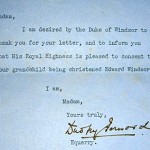
!["At Fairbridge Farm, the children just had stainless steel plates but staff had china [with] the Fairbridge emblem stamped on them. When the farm closed down in '74, [they] were auctioned."](../../../cms/wp-content/uploads/2008/08/plate-150x150.jpg)
!["I was in the news because my name was granted by the [British royal family]. That's my sister, Frances, with me. There was coloured blood in the family and it showed on [her]. I was 10 when I left England [but] she couldn’t come because of the 'White Australia' policy. [Fairbridge] were reluctant to let me go on my own but eventually they gave me the okay. My sister went into a national children's home in the UK."](../../../cms/wp-content/uploads/2008/08/news-150x150.jpg)
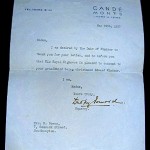
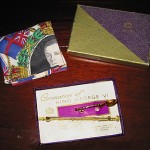
!["I was nine when the doctor recommended I go to the Fairbridge home at Benington, a beautiful, rural setting in England. There was quite a lot of happiness there. It had a big fountain and we used to shoot the frogs on the lilies - we were going through the bow and arrow stage! We have had several trips back [to the UK] and visited Benington twice. A colonel was selling it and gave me one of those [brochures]."](../../../cms/wp-content/uploads/2008/08/brochure-150x150.jpg)
